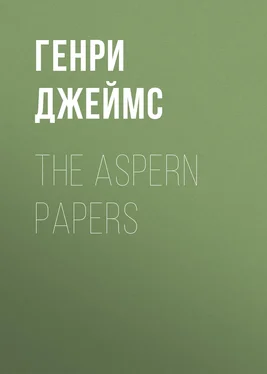Генри Джеймс - The Aspern Papers
Здесь есть возможность читать онлайн «Генри Джеймс - The Aspern Papers» — ознакомительный отрывок электронной книги совершенно бесплатно, а после прочтения отрывка купить полную версию. В некоторых случаях можно слушать аудио, скачать через торрент в формате fb2 и присутствует краткое содержание. Жанр: Социально-психологическая фантастика, foreign_antique, foreign_prose, на английском языке. Описание произведения, (предисловие) а так же отзывы посетителей доступны на портале библиотеки ЛибКат.
- Название:The Aspern Papers
- Автор:
- Жанр:
- Год:неизвестен
- ISBN:нет данных
- Рейтинг книги:5 / 5. Голосов: 1
-
Избранное:Добавить в избранное
- Отзывы:
-
Ваша оценка:
- 100
- 1
- 2
- 3
- 4
- 5
The Aspern Papers: краткое содержание, описание и аннотация
Предлагаем к чтению аннотацию, описание, краткое содержание или предисловие (зависит от того, что написал сам автор книги «The Aspern Papers»). Если вы не нашли необходимую информацию о книге — напишите в комментариях, мы постараемся отыскать её.
The Aspern Papers — читать онлайн ознакомительный отрывок
Ниже представлен текст книги, разбитый по страницам. Система сохранения места последней прочитанной страницы, позволяет с удобством читать онлайн бесплатно книгу «The Aspern Papers», без необходимости каждый раз заново искать на чём Вы остановились. Поставьте закладку, и сможете в любой момент перейти на страницу, на которой закончили чтение.
Интервал:
Закладка:
The gondola stopped, the old palace was there; it was a house of the class which in Venice carries even in extreme dilapidation the dignified name. “How charming! It’s gray and pink!” my companion exclaimed; and that is the most comprehensive description of it. It was not particularly old, only two or three centuries; and it had an air not so much of decay as of quiet discouragement, as if it had rather missed its career. But its wide front, with a stone balcony from end to end of the piano nobile or most important floor, was architectural enough, with the aid of various pilasters and arches; and the stucco with which in the intervals it had long ago been endued was rosy in the April afternoon. It overlooked a clean, melancholy, unfrequented canal, which had a narrow riva or convenient footway on either side. “I don’t know why—there are no brick gables,” said Mrs. Prest, “but this corner has seemed to me before more Dutch than Italian, more like Amsterdam than like Venice. It’s perversely clean, for reasons of its own; and though you can pass on foot scarcely anyone ever thinks of doing so. It has the air of a Protestant Sunday. Perhaps the people are afraid of the Misses Bordereau. I daresay they have the reputation of witches.”
I forget what answer I made to this—I was given up to two other reflections. The first of these was that if the old lady lived in such a big, imposing house she could not be in any sort of misery and therefore would not be tempted by a chance to let a couple of rooms. I expressed this idea to Mrs. Prest, who gave me a very logical reply. “If she didn’t live in a big house how could it be a question of her having rooms to spare? If she were not amply lodged herself you would lack ground to approach her. Besides, a big house here, and especially in this quartier perdu, proves nothing at all: it is perfectly compatible with a state of penury. Dilapidated old palazzi, if you will go out of the way for them, are to be had for five shillings a year. And as for the people who live in them—no, until you have explored Venice socially as much as I have you can form no idea of their domestic desolation. They live on nothing, for they have nothing to live on.” The other idea that had come into my head was connected with a high blank wall which appeared to confine an expanse of ground on one side of the house. Blank I call it, but it was figured over with the patches that please a painter, repaired breaches, crumblings of plaster, extrusions of brick that had turned pink with time; and a few thin trees, with the poles of certain rickety trellises, were visible over the top. The place was a garden, and apparently it belonged to the house. It suddenly occurred to me that if it did belong to the house I had my pretext.
I sat looking out on all this with Mrs. Prest (it was covered with the golden glow of Venice) from the shade of our felze, and she asked me if I would go in then, while she waited for me, or come back another time. At first I could not decide—it was doubtless very weak of me. I wanted still to think I MIGHT get a footing, and I was afraid to meet failure, for it would leave me, as I remarked to my companion, without another arrow for my bow. “Why not another?” she inquired as I sat there hesitating and thinking it over; and she wished to know why even now and before taking the trouble of becoming an inmate (which might be wretchedly uncomfortable after all, even if it succeeded), I had not the resource of simply offering them a sum of money down. In that way I might obtain the documents without bad nights.
“Dearest lady,” I exclaimed, “excuse the impatience of my tone when I suggest that you must have forgotten the very fact (surely I communicated it to you) which pushed me to throw myself upon your ingenuity. The old woman won’t have the documents spoken of; they are personal, delicate, intimate, and she hasn’t modern notions, God bless her! If I should sound that note first I should certainly spoil the game. I can arrive at the papers only by putting her off her guard, and I can put her off her guard only by ingratiating diplomatic practices. Hypocrisy, duplicity are my only chance. I am sorry for it, but for Jeffrey Aspern’s sake I would do worse still. First I must take tea with her; then tackle the main job.” And I told over what had happened to John Cumnor when he wrote to her. No notice whatever had been taken of his first letter, and the second had been answered very sharply, in six lines, by the niece. “Miss Bordereau requested her to say that she could not imagine what he meant by troubling them. They had none of Mr. Aspern’s papers, and if they had should never think of showing them to anyone on any account whatever. She didn’t know what he was talking about and begged he would let her alone.” I certainly did not want to be met that way.
“Well,” said Mrs. Prest after a moment, provokingly, “perhaps after all they haven’t any of his things. If they deny it flat how are you sure?”
“John Cumnor is sure, and it would take me long to tell you how his conviction, or his very strong presumption—strong enough to stand against the old lady’s not unnatural fib—has built itself up. Besides, he makes much of the internal evidence of the niece’s letter.”
“The internal evidence?”
“Her calling him ‘Mr. Aspern.’”
“I don’t see what that proves.”
“It proves familiarity, and familiarity implies the possession of mementoes, or relics. I can’t tell you how that ‘Mr.’ touches me—how it bridges over the gulf of time and brings our hero near to me—nor what an edge it gives to my desire to see Juliana. You don’t say, ‘Mr.’ Shakespeare.”
“Would I, any more, if I had a box full of his letters?”
Читать дальшеИнтервал:
Закладка:
Похожие книги на «The Aspern Papers»
Представляем Вашему вниманию похожие книги на «The Aspern Papers» списком для выбора. Мы отобрали схожую по названию и смыслу литературу в надежде предоставить читателям больше вариантов отыскать новые, интересные, ещё непрочитанные произведения.
Обсуждение, отзывы о книге «The Aspern Papers» и просто собственные мнения читателей. Оставьте ваши комментарии, напишите, что Вы думаете о произведении, его смысле или главных героях. Укажите что конкретно понравилось, а что нет, и почему Вы так считаете.












